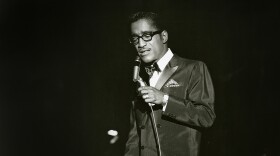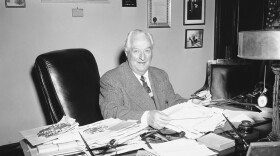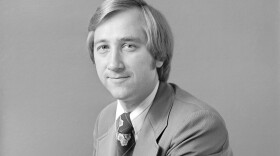UNLV is having a celebration. This year marks its sixtieth birthday, as well as the fiftieth anniversaries of the business and hotel colleges, the Special Collections department, and the Barrick Museum of Art.
Now, UNLV has a few different possible birthdays. The University of Nevada in Reno sent a young English professor, James Dickinson, to start the first college classes here in 1951 at Las Vegas High School. The first graduating class at what became Nevada Southern University was in 1964, the state’s centennial. And the school became the University of Nevada, Las Vegas, in 1969. But September 10, 1957, was the big day.
That’s when classes began at the first building on the UNLV campus. That was a significant moment. The school had a new dean in charge, William Carlson, who had been the dean of student affairs in Reno. Carlson greeted students and faculty at the structure.
The groundbreaking for the building had been on April 30, 1956. R. Guild Gray, the Clark County School District superintendent and a big university supporter, emceed the event. Milton Prell’s Sahara Hotel donated money to plant a lawn. At one point, Moe Dalitz provided the furniture. Since he and his partners Irwin Molasky, Merv Adelson, and Allard Roen built a lot of the buildings on Maryland Parkway, they also did a lot to create the street that UNLV is located on.
[[field:story]]
The building was thirteen thousand square feet. It contained the entire operation. That included offices for administrators, the one office for faculty, classrooms, the library, and the science lab. Adding to the cozy feeling, since there was no storage space, the hallway was lined with cages for snakes, frogs, and lizards for the biology class—and morale was high except for the occasional escaped snake. Today, the campus is home to 30,000 students and more than a thousand faculty, as well as various staff and administrators … and proper lab space.
Today, UNLV’s athletic tradition includes the national championship won by the Runnin’ Rebels basketball team, some great athletes who have gone on to star in various sports, championship rodeo and golf teams … but things were a bit more modest sixty years ago. The bowling team met every Thursday night at a local bowling alley.
The names of the pioneers dot the campus. When his tenure was done as dean, Carlson taught education classes, and the building is named for him. An auditorium in it is named for Holbert Hendrix, who arrived in 1956. The building that houses the history, political science, and anthropology departments is named for John Wright, the first tenured history professor, also hired in 1956. Jim Dickinson’s name graces the plaza outside the library.
The name put on the first building was that of Maude Frazier. She spent twenty years as Las Vegas school superintendent, and later won a seat in the legislature. If anybody can be called the mother of UNLV, it’s Frazier, who fought first for a school, then a campus, then a better school and campus. At the groundbreaking, she got to shovel the first bit of dirt to start the construction.








